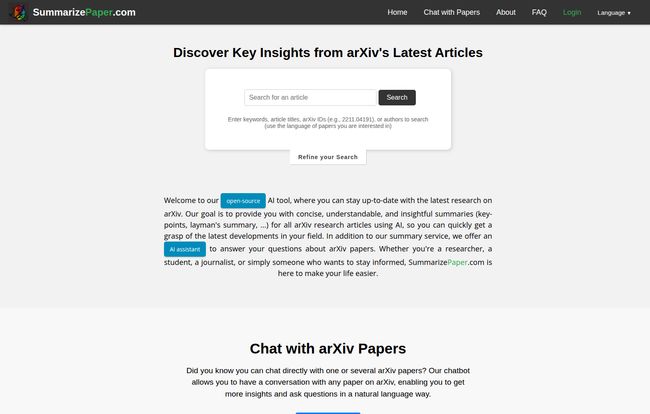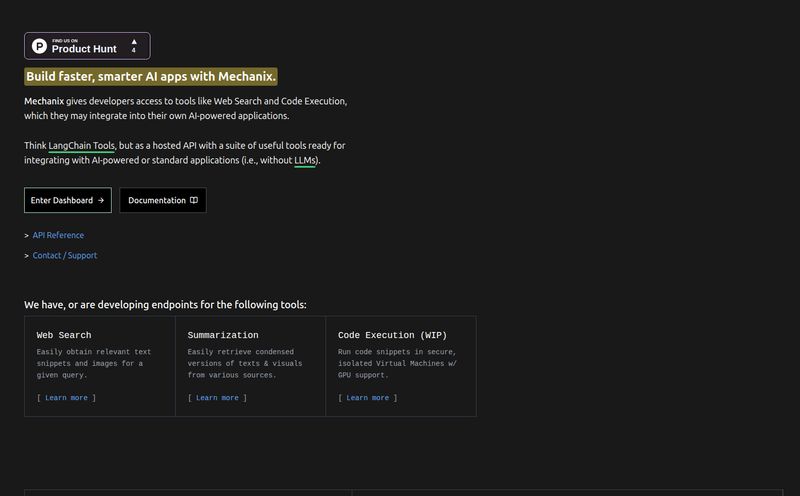If you're in any field that even remotely touches science, tech, or academia, you know the struggle. The information firehose. We all know it. It feels like every ten minutes, a groundbreaking—or at least, a very long—new paper drops on arXiv.org, and keeping up can feel like a full-time job on top of your actual full-time job.
For years, my routine was to bookmark a dozen papers, promising myself I'd read them over the weekend. Spoiler: I never did. I’d just end up with a browser graveyard of good intentions. So, when another AI tool promising to solve all my problems slid across my desk, I was, let's say, healthily skeptical. But this one, SummarizePaper.com, felt a little different. It wasn’t trying to be everything to everyone. It had one target in its sights: that wild, untamed beast known as the arXiv repository.
So, What Exactly is SummarizePaper?
At its heart, SummarizePaper is an AI-powered service designed to do one thing exceptionally well: give you the gist of dense academic papers without you needing to brew a gallon of coffee first. It takes those intimidating, jargon-filled PDFs from arXiv and breaks them down into concise, understandable summaries. Think of it as the brilliant intern you wish you had—one that reads papers for you and gives you the highlights.

Visit SummarizePaper .com
The site itself is refreshingly simple. No bells and whistles, no pop-ups begging you to join a newsletter. Just a search bar, daring you to plug in a paper and see what happens. It's clearly built for researchers, students, journalists, and well, curious people like me who want to sound smart about quantum computing at the next (virtual) cocktail party.
The Features That Actually Matter
A tool is only as good as its features, right? Here’s where I think SummarizePaper gets interesting.
The Core of It All: AI-Powered Summaries
This is the main event. You feed it an arXiv ID, title, or keyword, and it spits back a summary. But it's not just one block of text. It typically gives you a few different flavors: key points in bullet-style lists, a more narrative summary, and sometimes even a “laymans summary.” This is a fantastic touch. It acknowledges that not everyone reading the paper needs the same level of granularity. Sometimes you need the technical details; other times, you just need to understand the core finding without the complex math.
Chatting with a PDF? The Future is Now
Okay, this is the feature that made me sit up and go, “huh, that’s cool.” The platform lets you chat with the paper directly. I know it sounds a bit sci-fi, but it’s incredibly practical. Instead of just getting a static summary, you can open a chat window and ask the paper questions in plain English. For example, I pulled up a paper on black box LLMs and asked, “What was the primary limitation identified by the authors?” and it gave me a direct, sourced answer from the text. It’s like having a conversation with the research itself, which is a wild and genuinely useful experience.
The AI Assistant: Your Personal Research Intern
Slightly different from the chat, the AI assistant is more of a Q&A feature about the paper's content. It’s your go-to for clarifying specific terms or asking about the methodology without having to skim through 30 pages to find that one sentence. It’s fast, its direct, and it helps bridge the gap between reading a summary and truly understanding the paper's foundations.
Putting It to the Test: My Experience with SummarizePaper
I decided to throw a few recent machine learning papers at it. The search function is solid—you can use keywords, author names, or the direct arXiv ID, which is my preffered method. The interface is clean and loads quickly.
The summaries were… surprisingly good. They captured the essence of the abstracts and conclusions effectively. Were they perfect? No. AI is still AI. It sometimes misses the subtle nuance or the understated snark that academics occasionally sneak into their papers. But for getting a rapid overview and deciding if a paper is worth a full read? Absolutely invaluable. It turned my hour-long “should I read this?” process into about five minutes. In my book, that's a massive win.
The Good, The Bad, and The AI-Generated
No tool is a silver bullet, and it's important to see both sides. I wouldn't be a good SEO blogger if I didn't give you the full picture.
On one hand, the time-saving aspect is undeniable. This tool cuts through the clutter like nothing else I've tried for this specific purpose. The interactive chat and Q&A features are more than just gimmicks; they actively change how you can engage with research material. It makes the whole process less passive and more of a two-way street.
However, you need to go in with the right expectations. The accuracy of the summary is entirely dependent on the AI's interpretation. It's a fantastic first-pass filter, but I wouldn't write a dissertation chapter based solely on its output. It might miss a critical caveat buried in the appendix or a subtle turn of phrase that changes the context. And, of course, its biggest strength is also its main limitation: it's laser-focused on arXiv. If the research you're interested in is published elsewhere, you're out of luck.
What's the Damage? A Look at Pricing
This is where things get a bit mysterious. I scoured the site for a pricing page, a subscription link, anything with a dollar sign. And I found... nothing. Zilch. The pricing page URL seems to lead to a 404 error, which is telling.
My best guess? SummarizePaper is currently free to use, possibly as a public beta or as a project supported by a larger entity. This is fantastic news for users, of course. There’s no barrier to entry. Just jump in and start summarizing. I’m sure a monetization strategy is on the roadmap, but for now, it's an open playground for the curious.
Who is This Tool Really For?
The obvious answer is academics and PhD students. But I think the audience is much broader.
- Content Marketers & SEOs: Want to write an authoritative article on the latest AI developments? Go to the source. This tool makes the primary research accessible.
- University Students: Drowning in papers for a literature review? Here’s your lifeboat. Get the main ideas from 20 papers in the time it would’ve taken you to read two.
- Journalists & Tech Reporters: On a tight deadline to cover a new scientific breakthrough? This will give you the key takeaways and quotable insights in minutes.
- Product Managers & Engineers: Need to stay on the cutting edge of your field? Use this to quickly vet new techniques and ideas without falling down a research rabbit hole.
Frequently Asked Questions about SummarizePaper
- Is SummarizePaper free to use?
- As of right now, it appears to be completely free. There is no pricing information available on their website, and you can use all the core features without hitting a paywall.
- How accurate are the AI summaries?
- They are generally quite accurate for capturing the main points, methodology, and conclusions. However, an AI can miss subtle nuances, so it's best used as a tool for initial assessment rather than a complete replacement for reading the paper if the details are critical to you.
- Can I use SummarizePaper for papers not on arXiv?
- No. The platform is specifically designed to work with the arXiv.org repository. It does not support other databases or direct PDF uploads at this time.
- What's the difference between the AI assistant and the chat feature?
- Think of the AI assistant as a quick Q&A bot for factual recall from the paper (e.g., "What dataset was used?"). The chat feature is more conversational, allowing for more natural language interaction and follow-up questions to "talk through" the paper's concepts.
- Do I need to create an account to use it?
- You can perform searches and get summaries without an account. However, creating an account (which is free) will likely provide access to features like history or saving papers.
Final Thoughts: Is SummarizePaper Worth Your Time?
So, what’s the final verdict? I came in a skeptic and I'm walking away impressed. SummarizePaper isn't a magical solution that will do your job for you, but it's an incredibly powerful and well-designed assistant. It streamlines the most tedious part of research—the initial filtering—and adds a layer of interactivity that I haven't seen executed this well elsewhere.
If you're someone who needs to stay on top of the latest academic research but lacks the infinite time the task demands, give it a shot. It might just become your new favorite tool for navigating the academic jungle. It won't replace your critical thinking, but it will give you a whole lot more time to actually use it.
Reference and Sources
- SummarizePaper.com - The AI tool for arXiv paper summaries.
- arXiv.org - The open-access archive for scholarly articles.



